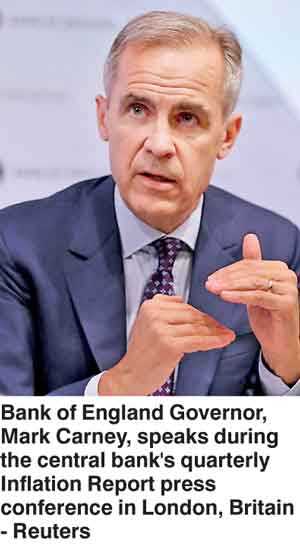Sunday Feb 22, 2026
Sunday Feb 22, 2026
Friday, 10 August 2018 00:10 - - {{hitsCtrl.values.hits}}
 LONDON (Reuters): The likelihood Britain crashes out of the European Union without a trade deal has increased, an outcome that would hurt an already weak pound, according to economists and foreign exchange strategists polled by Reuters.
LONDON (Reuters): The likelihood Britain crashes out of the European Union without a trade deal has increased, an outcome that would hurt an already weak pound, according to economists and foreign exchange strategists polled by Reuters.
Bank of England Governor Mark Carney said on Friday Britain faces an “uncomfortably high” risk of leaving the EU with no deal, while on Sunday trade minister Liam Fox put the odds of such an outcome at 60-40.
But economists were far less pessimistic, giving a median 25% chance no agreement was reached. That was, however, higher than the 20% in a July poll.
A dozen of 27 common contributors between that poll and this upped their forecast. Thirteen left them unchanged and two cut them.
“Given the talk over recent weeks the perception of no deal has increased. Fundamentally our base case is still that some kind of deal is struck. A deal is more likely than no deal,” said James Smith at ING.
Sterling fell on Wednesday, slumping below $1.29 for the first time in almost a year, in a sell-off fuelled by investor concern Britain will crash out of the EU without a trade deal. The poll was largely taken ahead of this latest fall.
However, 80% of economists said the most likely outcome will be the two sides agreeing on an EU-UK free trade deal, as has been predicted since Reuters first began polling on this in late 2016.
But in an upgraded second place was leaving without an agreement and trading under basic World Trade Organization rules.
Slipping to third place, according to those polled, was the scenario where Britain would belong to the European Economic Area, paying to maintain full access to the EU’s single market.
Once again, their least probable scenario was a decision to reverse Brexit.
Peter Dixon at Commerzbank said: “Despite the apparent increase in the likelihood of a disorderly Brexit, it is not in the interest of either party that this should happen and as a result I hold to the opinion that the cliff edge can (and must) be avoided.”
But if that common view is wrong and the two sides part ways without a deal then sterling would fall to $1.20, according to the median forecast given by foreign exchange strategists polled in the past week.
Since the Brexit vote sterling is down nearly 14% versus the dollar. While it is unlikely to fully recoup those losses anytime soon, expectations for a deal have driven expectations for a strengthening pound.
In one month, cable will be stronger at $1.31 and then at 1.34 by end-January – just two months before Britain is due to leave the EU – the poll forecast.
By end-July next year, it suggested, sterling will have rallied to $1.38, probably supported by an expected rate hike from the Bank of England.
Last week, the nine members of the Monetary Policy Committee voted unanimously to push British interest rates above their financial crisis lows but signalled they were in no hurry to raise them further. That unanimity came despite widespread criticism by economists that it was not necessary.
Adding 25 basis points, they took the Bank Rate to 0.75%. Economists polled by Reuters largely agreed the MPC would take its time, with the next hike – also of 25 basis points – not expected until the second quarter, just after Brexit.
An overwhelming majority of respondents said the Bank was likely to raise rates within the next year and similarly agreed that it was unlikely to cut rates.
The European Central Bank, which last month reaffirmed plans to end its 2.6 trillion-euro stimulus program this year, is expected to raise its interest rates in the quarter after the BoE does.
So against the common currency the pound will move little. In one month one euro will get you 89.0 pence, in six months 88.0p and the same in a year, the poll found. It was trading around 90.0p on Wednesday.
British inflation jumped after the Brexit vote, largely driven by sterling’s fall, making imports more expensive, and it is only expected to be back at the central bank’s 2% target in the third quarter of next year.
With prices rising more sharply, and Brexit uncertainty unsettling business and consumer confidence, growth has steadily slowed. Britain’s economy was predicted to grow 1.3% this year and then pick up to 1.5% next, albeit still lagging its peers.